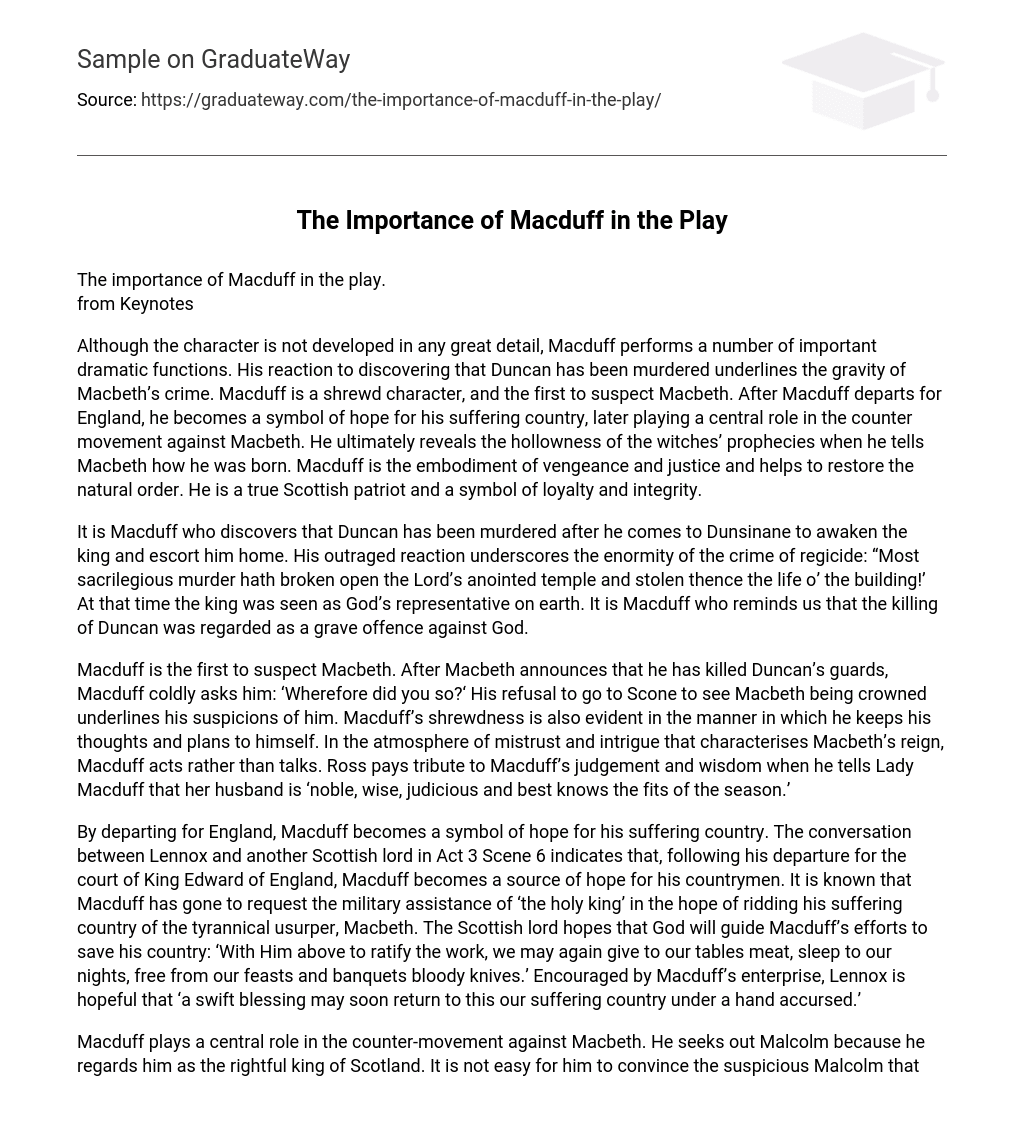Although the character is not developed in any great detail, Macduff performs a number of important dramatic functions. His reaction to discovering that Duncan has been murdered underlines the gravity of Macbeth’s crime. Macduff is a shrewd character, and the first to suspect Macbeth.
After Macduff departs for England, he becomes a symbol of hope for his suffering country, later playing a central role in the counter movement against Macbeth. He ultimately reveals the hollowness of the witches’ prophecies when he tells Macbeth how he was born. Macduff is the embodiment of vengeance and justice and helps to restore the natural order. He is a true Scottish patriot and a symbol of loyalty and integrity.
It is Macduff who discovers that Duncan has been murdered after he comes to Dunsinane to awaken the king and escort him home. His outraged reaction underscores the enormity of the crime of regicide: “Most sacrilegious murder hath broken open the Lord’s anointed temple and stolen thence the life o’ the building!’ At that time the king was seen as God’s representative on earth. It is Macduff who reminds us that the killing of Duncan was regarded as a grave offence against God.
Macduff is the first to suspect Macbeth. After Macbeth announces that he has killed Duncan’s guards, Macduff coldly asks him: ‘Wherefore did you so?‘ His refusal to go to Scone to see Macbeth being crowned underlines his suspicions of him. Macduff’s shrewdness is also evident in the manner in which he keeps his thoughts and plans to himself. In the atmosphere of mistrust and intrigue that characterises Macbeth’s reign, Macduff acts rather than talks. Ross pays tribute to Macduff’s judgement and wisdom when he tells Lady Macduff that her husband is ‘noble, wise, judicious and best knows the fits of the season.’
By departing for England, Macduff becomes a symbol of hope for his suffering country. The conversation between Lennox and another Scottish lord in Act 3 Scene 6 indicates that, following his departure for the court of King Edward of England, Macduff becomes a source of hope for his countrymen.
It is known that Macduff has gone to request the military assistance of ‘the holy king’ in the hope of ridding his suffering country of the tyrannical usurper, Macbeth. The Scottish lord hopes that God will guide Macduff’s efforts to save his country: ‘With Him above to ratify the work, we may again give to our tables meat, sleep to our nights, free from our feasts and banquets bloody knives.’ Encouraged by Macduff’s enterprise, Lennox is hopeful that ‘a swift blessing may soon return to this our suffering country under a hand accursed.’
Macduff plays a central role in the counter-movement against Macbeth. He seeks out Malcolm because he regards him as the rightful king of Scotland. It is not easy for him to convince the suspicious Malcolm that he can trust him. He underlines the extent of Scotland’s suffering under Macbeth’s tyranny (‘…each new day, new widows howl, new orphans cry, new sorrows strike heaven in the face’) in the hope of rousing Malcolm into action.
When Malcolm declares that he would be an even greater tyrant than Macbeth, Macduff’s cry of despair (‘O Scotland, Scotland’) makes it clear that he is a genuine Scottish patriot. Macduff ultimately succeeds in promoting the rightful king of Scotland into action as Malcolm places himself at Macduff’s and his country’s disposal. ‘What am I truly is thine and my poor country’s to command’. Along with Malcolm, Macduff leads the forces of good against the diabolical Macbeth.
When he finally comes face to face with Macbeth, Macduff reveals the hollowness of the witches’ prophecies. The witches have filled Macbeth with a false sense of security, and he is now convinced that his is ‘a charmed life that must not yield to one of woman born.’ However, Macduff points out that he ‘was from his mother’s womb untimely ripped.’ It is only now that Macbeth realises that the witches have tricked him with double-meaning prophesies: ‘And be these juggling fiends no more believed that palter with us in a double sense.’
The slaughter of his entire family means that Maccduff becomes the embodiment of vengeance and justice. After Ross delivers the devastating news to him, Macduff implores the heavens to bring Macbeth, ‘this fiend of Scotland’ within his sword’s length’. When he enters Macbeth’s castle, Macduff reflects that his wife and children will haunt him if he is not the one to kill Macbeth. It is entirely appropriate that Macduff should be Macbeth’s nemesis.
By killing Macbeth, Macduff not only gains the vengeance he craves, but helps to restore the natural order in Scotland. When he re-enters the final scene holding ‘the usurper’s head’, Macduff declares that ‘the time is free’. It is also Macduff who hails Malcolm as King of Scotland.
As a symbol of loyalty and integrity Macduff is the moral opposite of Macbeth. While Macbeth is driven by ambition and self-interest, Macduff is a true Scottish patriot who puts the well-being of his country before all else. His concern for his country is deep and genuine: ‘O nation miserable, with an untitled tyrant, bloody-sceptred’. Macduff was totally loyal to Duncan whom he describes as ‘a most sainted king’.
Following Duncan’s murder, Macduff gives his allegiance to Malcolm whom he now regards as the lawful king. Malcolm is hugely impressed by Macduff’s patriotism, calling him ‘child of integrity’. Indeed Macduff’s love of his country is such that when Ross arrives in England, Macduff asks about his country before enquiring about his family. He pays an extremely high price for his efforts to rid Scotland of the tyrannical Macbeth. It is appropriate that the final battle in the war between good and evil should be between Macduff and Macbeth. Macduff’s victory is symbolic of good triumphing over evil.





